
Table of Contents
ToggleWhat Is Nutrition And Why It Is Important
Adapting right nutrition is the first step for leading a healthy lifestyle. The food we eat gives our body, the vital nutrients that are required for the growth, development and optimal functioning.
Understanding importance and role of these nutrients are very necessary for maintaining good health. This article explains about the importance of a balanced diet and highlights the essential nutrients that are required for the functioning of body.
What Are Nutrients And Why Do We Need Them
Nutrients are substances that are found in food which is essential for the functioning of body properly. They provide the energy and building blocks which is needed for growth, repair and maintenance of tissues. Nutrients contains carbohydrates, proteins, fats, vitamins, minerals and water.
We need nutrient in body for functions such as metabolism, immunity, bone health, and cognitive ability. A balanced intake of these vital nutrients are very necessary for overall health, vitality and disease prevention.
Types of Nutrients
a) Macronutrients
b) Micronutrients
Macronutrients
Macronutrients are the three major categories of nutrients that our bodies require in relatively large amounts. They provide the energy that is needed for daily activities and for various functions of body. Let’s look into each macronutrient in detail:

- Carbohydrates: These are the body’s primary source of energy. They are converted into glucose, which fuels our cells. Good sources of carbohydrates include whole grains, fruits, vegetables, legumes and dairy products.
Carbohydrates can be classified into simple (found in foods like fruits and sugar) or complex (found in foods like whole grains and starchy vegetables). Complex carbohydrates generally provide more sustained energy due to their higher fiber content. - Proteins: This macronutrient is essential for the growth, repair and maintenance of tissues in our body. They are made up of amino acids which are the building blocks of proteins.
Good sources of protein include meat, poultry, fish, eggs, dairy products, legumes, nuts and seeds. Proteins are involved in various functions such as the formation of enzymes, hormones, antibodies and muscle tissue. - Fats: This nutrient are a concentrated source of energy which provides insulation, protection and cushioning for organs. They also assist in the absorption of fat-soluble vitamins and contribute to hormone production.
Healthy sources of fats include avocados, nuts, seeds, olive oil, fatty fish (such as salmon) and plant-based oils. It is important to consume unsaturated fats (monounsaturated and polyunsaturated) while limiting saturated and trans fats, as the latter can have negative effects on health.
While macronutrients are primarily sources of energy, they also have secondary functions. For instance, carbohydrates can provide dietary fiber which aids in digestion and promotes a healthy gut. Proteins and fats can also be used for energy when carbohydrates are limited.
Maintaining a balanced intake of macronutrients are very necessary for overall health. The appropriate amount of each macronutrient may vary depending upon factors such as age, sex, activity level and specific health goals.
Consulting a registered dietitian or nutritionist can provide personalized guidance on determining the ideal macronutrient distribution according to your needs.
Micronutrients
Micronutrients are essential nutrients required by the body in relatively small amounts but are vital for various physiological functions. These include vitamins and minerals, which play critical role in maintaining overall health. Let’s explore micronutrients in detail:

- Vitamins: Vitamins are organic compounds that our bodies need in small quantities to support metabolism, growth and overall health. There are two types of vitamins: water-soluble and fat-soluble.
- There are two types of vitamins
- Fat-Soluble Vitamins
- Water-Soluble Vitamins
- There are two types of vitamins
- Fat–soluble vitamins include vitamins A, D, E, and K. These vitamins are stored in the body’s fat tissues and liver, and excess amounts can accumulate over time. They play vital roles in vision, bone health, immune function, and antioxidant protection.
- Water–soluble vitamins include vitamin C and the B vitamins (such as B1, B2, B3, B6, B12, folate, and biotin). They are not stored in the body and need to be replenished regularly through diet or supplementation.
2. Minerals: Minerals are inorganic substances required in small amounts for various physiological functions. They are involved in the formation of bones and teeth, muscle contraction, nerve function, fluid balance and the production of enzymes and hormones.
3. Some important minerals include:
- Calcium: Essential for strong bones and teeth, as well as proper muscle and nerve function.
- Iron: Needed for the production of red blood cells and oxygen transport.
- Zinc: Supports immune function, wound healing and DNA synthesis.
- Magnesium: Involved in hundreds of enzymatic reactions and contributes to bone health and muscle function.
- Potassium: Helps maintain fluid balance, supports heart health and regulates blood pressure.
Micronutrients are found in a wide range of foods including fruits, vegetables, whole grains, lean meats, dairy products, nuts and seeds.
Consuming a varied and balanced diet is key to ensuring an adequate intake of micronutrients. In some cases, dietary supplements may be recommended, especially for individuals with specific deficiencies or special dietary needs.
It’s important to note that while micronutrients are required in smaller amounts compared to macronutrients their absence or deficiency can lead to various nutrient-related deficiencies and health issues.
Consulting a healthcare professional or registered dietitian can help assess individual nutrient needs and provide guidance on achieving a well-balanced diet rich in essential micronutrients.
WATER
Water is often considered an essential nutrient for the body. While it doesn’t provide energy or calories like macronutrients do, it plays an essential role in maintaining overall health and supporting various physiological functions. Here’s why water is considered a nutrient:

- Hydration: Water is very necessary for the maintenance of hydration levels in the body. It helps to regulate body temperature, transport vital nutrients and oxygen to cells, and facilitate waste removal through urine and sweat.
- Solvent and Medium for Chemical Reactions: Water serves as a universal solvent, allowing many vital substances like minerals, vitamins and enzymes to dissolve and be transported throughout the body. It also acts as a medium for various chemical reactions involved in metabolism and nutrient absorption.
- Lubrication and Protection: Water helps lubricate and cushion joints, organs, and tissues, promoting smooth movement and protecting them from damage and injury.
- Digestion and Nutrient Absorption: Water is involved in the digestion and absorption of nutrients. It also helps to break-down the food, aids in the absorption of vital nutrients in the gastrointestinal tract, and facilitates the movement of waste through the digestive system.
- Electrolyte Balance: Water helps in maintaining electrolyte balance in the body by facilitating the movement of electrolytes (such as sodium, potassium, and chloride) across cell membranes. This balance is essential for the proper functioning of nervous system, muscle contraction, and overall cellular function.
- Cell Structure and Function: Water is a fundamental component of cells, which helps to enable the transportations of vital nutrients and waste in and out of cells.
While water itself does not contain vital nutrients like vitamins or minerals, it is necessary for the proper functioning of the body’s systems and support the delivery and utilization of essential nutrients. Adequate hydration is crucial for maintaining overall health. It is recommended to drink an appropriate amount of water each day, which may vary based on factors such as age, sex, activity level, climate and individual needs.
Leave a Reply